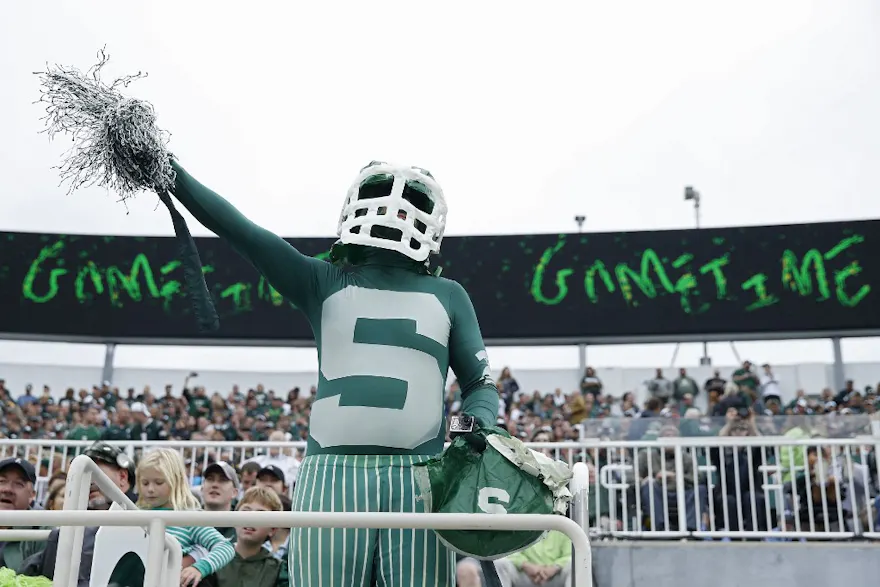Michigan State University Closes Door on Caesars Partnership

A prominent American university has recently cut ties with one of the top sportsbooks in the country as more is being focused on legal sports betting and its affect on young bettors.
There has been a lot made lately about the issues surrounding the legal sports betting industry and how its overall availability and advertising saturation has been affecting young fans in particular.
Last week, Opinion Diagnostics which was commissioned by NCAA president Charlie Baker to study the prevalence of sports betting among college-aged Americans released its final report. That study found that 58% of the 3,527 college-aged respondents have placed at least one sports bet. Roughly 71% of those asked admitted to being under the legal age to bet in their respective jurisdictions.
This week, perhaps not coincidentally, another high-level NCAA program ended a sportsbook partnership it signed in 2022. It was announced Tuesday that Michigan State University was walking away from a lucrative partnership with Caesars Sportsbook four years early due to pressure from politicians, its student body, and even some of the MSU staff.
More on the MSU/Caesars deal
Caesars sportsbook became “official and exclusive sports betting partner and iGaming partner of MSU athletics,” in January 2022. At the time, it was just the second such agreement between Caesars and a college athletics program, and first in Michigan sports betting history. Louisiana State University was the first to sign on with Caesars in September 2021.
Caesars gained naming rights to premium seating areas at MSU home venues as well as valuable signage, hospitality, and VIP experiences at the home stadiums of MSU teams. It was a chance at some irreplaceable exposure for Caesars in the competitive Michigan market.
In return, MSU received a reported $9 million “annual funds to support student-athlete responsible-gaming education, student scholarships, as well as internship and professional development opportunities for MSU students pursuing a career in the sports industry.”
Reasons for the breakup
The infiltration of gambling content into the North American sports viewing experience has been swift and has been somewhat troubling for lawmakers and the viewing public alike. There have been moves recently by various state legislatures to curtail the amount of sports betting content present during sports broadcasts on TV, radio, and social media outlets.
The aforementioned Opinion Diagnostics report, which was done in partnership with the NCAA, has also put a spotlight on just how sports betting and advertising has subverted those attending America’s universities and living on school campuses.
U.S. senator Richard Blumenthal has brought a lot of attention to the concerns surrounding sportsbook promotions on university and college campuses. He even wrote a letter to Caesars Entertainment CEO shedding light on such issues. He expressed "grave concerns" about the company's promotional tactics and reiterated his stance that "young people should not be targeted by sports wagering advertisements."
"Experts have said that it can be difficult for young people to recognize their inability to gamble responsibly, which could lead to serious mental and financial consequences," said Blumenthal on the issue of sports betting and the country's youth.
And then there are the recent issues surrounding cheating allegations in college baseball – ones that are tied to the gambling industry.
Bad press, problem gambling, and the need for more responsible gambling initiatives have dominated the industry news across America. Now it appears as though it is affecting lucrative partnership deals that at one time figured to become part of the North American sports viewing landscape.
What the university said
Michigan State University brass are saying all of the right things as their partnership with one of the top Michigan sports betting apps, Caesars comes to a close.
“Initially, it was a good thing, but I don’t think it’s in our best interest moving forward,” MSU athletic director Alan Haller told the Graham Couch of the Lansing State Journal in an interview.
What happens next is anyone’s guess. PointsBet recently ended its partnerships with the University of Colorado and University of Maryland which leaves LSU (who has a current sponsorship deal with Caesars) and the University of Denver (who has a deal with SuperBook) as the only two college programs with sports betting partners.
Chances are higher than ever that those partnerships are dissolved and that the NCAA starts putting the gambling industry at arm's length, rather than the apparent full embrace it had with providers only a few short months ago.







